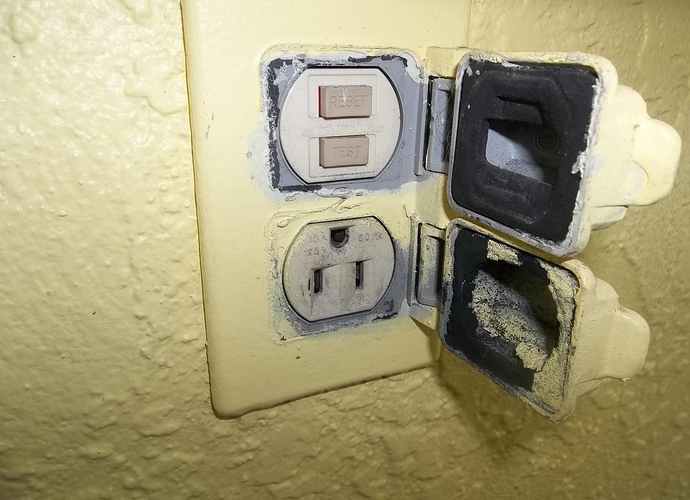First time seeing this type of GFCI. Is this a collectible now.
1973?
Yes old, recommend replacement because the trip times are very slow
Source?
It is a little device called an INSP-3, we actually do check the GFCI’s
Don’t you?
That has **zero **bearing on your statement regarding the OP’s device in question…
I guess you don’t check GFCI’S You asked how I determine the speed at which a GFCI trips and I told you. Those types of GFCI’S trip at a much slower rate than what is recommended, therefore I would recommend replacement.
Who cares.
It either trips or it doesn’t.
There is no reason to replace an older device as long as it opens the circuit when the self test button is pushed.
There are precise standards set for trip time and fault current. If the device works within these parameters, your personal opinion does not matter.
This PDF says the gfi should trip within 25 mS with a 500 ohm fault. Sounds like it would be hard to say what too long is when it trips that quickly.
https://www.nema.org/Products/Documents/NEMA-GFCI-2012-Field-Representative-Presentation.pdf
No, I didn’t.
I asked for the source of your information that the GFCI’s at the OP’s job site tripped at too slow a speed to be effective.
Were you on site with him?
Did you test and record the speed at which they tripped?
What is the manufacturers specification for the installed units?
Your “opinion” of being “too slow” gives the wrong impression to all newer inspectors reading this thread.
I’ve seen those old ones too.
When I test it does take a few seconds & I think it’s not gonna trip, but it does. How many heartbeats have gone by?
Let’s just say they are obsolete but functional.
I would use my new Extech circuit load tester that I won at the online Christmas party…measures the trip time. I love this thing! Thanks Nick!
1981 home. I really didn’t see a noticeable delay. Tripped with tester and by the test button. The newer one did not.
[quote=“tweiland, post:13, topic:103720”]
…my new Extech circuit load tester <snip> measures the trip time.
[QUOTE]
It is good to know there is a precise way to test the trip time and be able to say with authority that the GFCI device is out of spec.
I was thinking about buying one of those. I think it was a CT-70 and a CT-80 with a difference of about 100.00 and maybe AFCI testing capability.
Which model do you have? I am using the Ideal SureTest 61-164 and have used the 61-165 and find the 61-164 to be frustratingly slow running the initial diagnostics test. I mean like maybe over 10 seconds and when testing 40+ outlets that really adds up. Like 45 min total vs half the time for the other meter.
I have the CT70 http://www.inspectoroutlet.com/extech-ct70.aspx
I don’t use it for every outlet…I still depend upon a simple tester for standard outlets and use the CT70 for GFCI’s and if I have a suspect outlet or shady wiring. It is kind of amazing the trip times between a new and older GFCI outlet.
Good to know. I may buy the 70, not seeing the reasoning for going to the 80 for the price. The SureTest drives me nuts waiting for it to get past the initial diagnostics mode.
The SureTest will show a false ground. Where someone tied the ground to the neutral to trick the meter. But the meter sees practically zero impedance on the ground in that case and knows what is up. The only problem is that the one time I found a false ground, the receptacle was maybe a foot away from the panel. The owner had installed it himself. The panel being so close can trick the meter. I flagged it deficient. Not certain the CT70 will. Don’t care though if it is faster.


